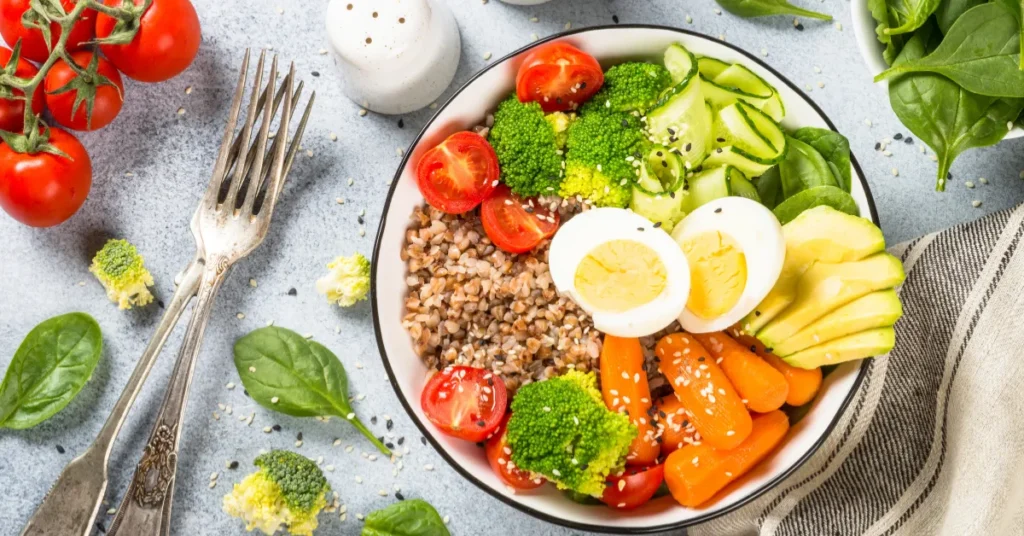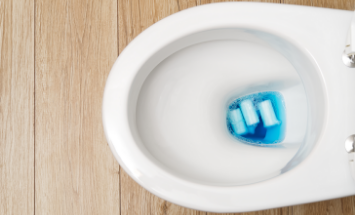Nutritional Yeast Nutrition Facts
Nutritional yeast is grown to be a food product and inactivated (killed) in processing. Its scientific formulation is Saccharomyces cerevisiae, and it is similar to the strains of this yeast used for baking bread and brewing beer. Nutritional yeast is also known as savory yeast or nooch.
Loaded with B vitamins, proteins, and other vitamins and minerals, nutritional yeast can fit into any diet. Some people will use nutritional yeast as a condiment because of its nutty, cheesy flavor and add it to their popcorn, pasta, and other favorite foods.
It is often used in vegan dishes to add flavor and as a thickener for dressings and sauces. You might find nutritional yeast in various recipes, including vegan mac and cheese, vegan burritos, palak tofu waffles, and pesto spaghetti squash.

This article will cover uses, benefits, and meal ideas for nutritional yeast.
What Nutritional Yeast Is (Origin, Form, and Taste)
Nutritional yeast, often called “nooch” by fans, is a deactivated strain of Saccharomyces cerevisiae, a type of yeast that’s grown specifically for its nutritional benefits. Unlike baking yeast, it won’t make bread rise, and unlike brewer’s yeast, it’s not bitter—instead, it has a naturally cheesy, nutty, and savory flavor.
Origin:
Nutritional yeast has been produced commercially since the mid-20th century, with roots in food innovation during and after World War II. It’s cultivated on nutrient-rich mediums like molasses, harvested, pasteurized to deactivate the yeast cells, and then dried.
Form:
You’ll usually find it in yellow flakes, granules, or powder, sold in health food stores and supermarkets. It’s lightweight, shelf-stable, and easy to sprinkle on food.
Taste:
Its taste is often described as umami-rich, cheesy, and slightly nutty, which makes it a favorite among vegans as a dairy-free cheese substitute. You can add it to popcorn, pasta, soups, and salads to boost flavor and nutrition.

How Nutritional Yeast is Made
Making nutritional yeast is a cool process. First, a special type of yeast is grown in a nutrient-rich liquid. This liquid often contains glucose, which comes from things like sugarcane or beet molasses. The yeast grows for several days, getting bigger and bigger.
Once the yeast is ready, it’s heated up. This heat “deactivates” the yeast, meaning it stops growing and is no longer alive. After that, the yeast is harvested, washed carefully, dried, and then packaged. The type of yeast used is usually a strain of Saccharomyces cerevisiae. These strains are chosen specifically for their good qualities as a food product. They are different from the strains used to make bread or beer.
Why It’s Popular Among Vegans, Vegetarians, and Health-Conscious People
Nutritional yeast is naturally rich in B vitamins (including B12 in fortified varieties), plant-based protein, and antioxidants. It’s dairy-free, gluten-free, and adds a cheesy, savory flavor without animal products—making it perfect for vegan and vegetarian cooking. Health-conscious people also value it for its nutrient density and low fat content.
Brief Difference Between Nutritional Yeast, Active Dry Yeast, and Brewer’s Yeast
| Feature | Nutritional Yeast | Active Dry Yeast | Brewer’s Yeast |
|---|---|---|---|
| Purpose | Used as a seasoning & supplement | Used for baking (makes dough rise) | Byproduct of beer brewing or grown for supplements |
| Form | Inactive, yellow flakes or powder | Granules of live yeast cells | Inactive powder or flakes |
| Flavor | Cheesy, nutty, umami | Neutral (no strong taste) | Bitter, earthy |
| Nutrients | Rich in B vitamins, protein | Minimal nutrients | High in protein, chromium, B vitamins (no B12 naturally) |
| Activity | Inactive (no rising) | Active (ferments & produces CO₂) | High in protein, chromium, and B vitamins (no B12 naturally) |
Nutritional Profile – Per 2 Tablespoons (~10 g)
| Nutrient | Amount | Key Notes |
|---|---|---|
| Calories | ~40 kcal | Low-calorie, nutrient-dense |
| Protein | ~4 g | Complete protein (contains all 9 essential amino acids) |
| Carbohydrates | ~3–4 g | Low carb, primarily from fiber |
| Fiber | ~2 g | Mostly beta-glucans, beneficial for gut health |
| Fat | ~0.5 g | Trace amounts, mostly unsaturated |
| Vitamin B12 | ~8–12 µg (333–500% DV) | Only in fortified varieties; crucial for energy, nerve health |
| Other B Vitamins | Thiamine (B1): 5–6 mg (400–500% DV) Riboflavin (B2): 5–6 mg (300–400% DV) Niacin (B3): ~35–40 mg (200% DV) Vitamin B6: ~4–5 mg (200% DV) Folate (B9): ~200–250 µg (50–60% DV) | Fortification greatly boosts levels |
| Minerals | Zinc: ~1–2 mg (10–15% DV) Selenium: ~5–8 µg (10–15% DV) Manganese: ~0.1–0.2 mg (5–10% DV) Iron: ~0.3–0.5 mg (2–4% DV) Magnesium: ~10–12 mg (2–3% DV) Potassium: ~100–200 mg (2–4% DV) | Amounts vary by brand |
Fortified vs. Unfortified Nutritional Yeast
| Aspect | Fortified | Unfortified |
|---|---|---|
| B Vitamins | High amounts due to fortification (especially B12) | Naturally contains some B vitamins, but lower levels; no B12 |
| Taste | Slightly stronger “cheesy” flavor in some brands | Mild, more natural yeast flavor |
| Color | Often more vibrant yellow (from added vitamins) | Paler yellow |
| Best For | People needing more vitamins (especially vegans) | Those avoiding synthetic vitamins or preferring minimal processing |
If you want, I can also prepare this as an easy-to-read nutrition label graphic so it’s Pinterest- or blog-ready for your “nutritional yeast” article. That would make your Peak Health Insights.
Nutrition Facts
While it cannot replace whole food, nutritional yeast can help provide much needed vitamins, especially to vegans and vegetarians, who often have concerns about getting enough B vitamins in their diets. Each serving contains a low amount of nutritional yeast calories but a high amount of protein, vitamins and minerals.
A two-tablespoon serving of nutritional yeast (about nine grams) contains approximately:
- Calories: 35
- Total Carbohydrates: 3 g
- Fiber: 2 g
- Total Fat: 0.5 g
- Protein: 5 g
- Vitamin B12: 14 mcg (583% DV*)
- Thiamine: 6 mg (500% DV)
- Riboflavin: 6 mg (462% DV)
- Vitamin B6: 6 mg (353% DV)
- Niacin: 32 mg (200% DV)
- Folate: 405 mcg (101% DV)
*Daily Value: Percentages are based on a diet of 2,000 calories a day.
In addition, it also contains some zinc, pantothenic acid, magnesium, copper, manganese, iron, calcium and potassium.
Keep in mind that this shows a fortified version. You can purchase nutritional yeast that has not been fortified as well. It may be a good idea to blend the two for optimal health benefits.
Health Benefits
- High in Complete Protein – Builds & repairs muscles, keeps you full longer.
- Rich in Vitamin B12 – Great for vegans & vegetarians.
- Supports Immunity—Packed with beta-glucans & antioxidants.
- Heart Friendly—Low sodium, high fiber, and cholesterol-friendly.
- Boosts Energy—B vitamins to power your metabolism.
- Balances Blood Sugar—Low glycemic impact for steady energy.
- Gut Health Hero—Fiber & prebiotics for a happy digestive system.
Potential Side Effects & Precautions
- Yeast Allergy: Avoid if you have a known yeast allergy.
- Purine Content: May trigger gout symptoms in people sensitive to purines.
- Digestive Discomfort: Can cause bloating or gas in sensitive individuals.
- Fortified Versions: If avoiding synthetic vitamins, check the label for fortification.
Potential Side Effects & Precautions
- Not for people allergic to yeast
- Purine content (gout risk)
- Possible digestive discomfort in sensitive individuals
- Watch for fortified versions if avoiding synthetic vitamins
Nutritional Yeast vs. Candida
Nutritional yeast is of the edible species S. cerevisiae. As it is killed and inactivated in processing, it cannot cause an infection. Live strains of S. cerevisiae (used in baking, brewing, and probiotics) are rarely associated with causing a fungal infection and usually only occur in people who have significant health problems like critical illness.7
Some other types of yeast, such as Candida albicans, are commonly associated with fungal infections such as vaginal yeast infections and oral thrush. Candida lives in small amounts on the skin and in other body areas. It is usually harmless, but if the environment is just right, it can grow out of control, and that overgrowth can lead to infection.

Benefits of Swapping Dairy for Nutritional Yeast
Nutritional yeast is a high-quality plant protein containing all nine amino acids you need from food.4 B vitamins found in fortified nutritional yeast include thiamine (B1), riboflavin (B2), niacin (B3), B6, and B12. Trace minerals found in nutritional yeast include phosphorus, magnesium, and zinc. All these vitamins and minerals offer many different health benefits.
Rich in Vitamin B12
Getting enough B12 is a nutritional concern for people who eat a diet that does not include animal products. You need B12 to keep your brain and blood cells healthy and prevent anemia (a deficiency of healthy red blood cells). One serving of fortified nutritional yeast is enough to get the required daily value of vitamin B12 and avoid B12 deficiency.
The recommended daily amount of vitamin B12 for most healthy adults is 2.4 micrograms (mcg). Increasing B12 might also reduce fatigue, and nutritional yeast might help the body maintain consistent energy levels because of its high B12 content.
Anti-Inflammatory and Antibacterial Benefits
Research shows that S. cerevisiae can support a healthy immune system and reduce inflammation. Nutritional yeast also has antimicrobial and antibacterial properties. It might be a promising therapy for Candida infections, such as thrush and yeast infections.2
Improved Skin, Nail, and Hair Health
Nutritional yeast provides many B vitamins. These can benefit your skin, nail, and hair health. Nutritional yeast also contains niacin (vitamin B3), which can be used to treat acne and other skin conditions.
May Help Control Blood Sugar
If you are trying to control your blood sugar, nutritional yeast might help. A small study reported in 2013 and published in the International Journal of Preventive Medicine looked at how brewer’s yeast affected blood sugar. Brewer’s yeast and nutritional yeast are both forms of Saccharomyces cerevisiae.
In this study, participants were given six 300 milligram (mg) supplements of brewer’s yeast per day. After 12 weeks, the study participants saw significant reductions in long-term blood glucose (A1c) and improvements in insulin sensitivity (how well your cells respond to the hormone insulin, which helps regulate blood sugar). However, larger and more current studies are needed to confirm this benefit.
Improves Irritable Bowel Syndrome Symptoms
Nutritional yeast may improve symptoms of irritable bowel syndrome (IBS), a common disorder of the stomach and intestines that causes abdominal pain, bloating, and bowel changes. A 2017 World Journal of Gastroenterology meta-analysis reviewed studies on the effect of S. cerevisiae supplements on gastrointestinal (GI) symptoms in 579 people with IBS.
Here, the report’s authors noted significant decreases in abdominal pain, discomfort, and bloating for those taking 500 mg daily for eight weeks. They further noted that nutritional yeast might be a promising treatment for IBS. Even so, there are different sources suggesting that nutritional yeast should be used carefully and in moderation by people with IBS.5
Promotes Heart Health
Nutritional yeast is a low-sodium, heart-healthy seasoning option that can add flavor to any dish. This is because it contains beta-glucan and potassium.
Beta-glucan is a natural component found in the cell walls of bacteria, fungi, yeast, and oat and barley foods. Higher intakes of beta-glucan could mean improved heart health, such as increasing good cholesterol and reducing bad cholesterol.
Additional benefits of beta-glucan include:
- Immune system support
- Improved gut health
- Decreased inflammation
- Regulated blood sugar
- Reduced obesity risk
Fortified nutritional yeast also contains potassium. According to the National Institutes of Health, increasing potassium intake can reduce your risk for heart disease, including high blood pressure, heart disease, and stroke.






